#Judith State
Photo

New York Film Festival 2022:
R.M.N. (Cristian Mungiu), 2022
#films#movies#stills#RMN#Cristian Mungiu#Marin Grigore#Judith State#Romanian#2020s#NYFF60#New York Film Festival#seen in 2022
4 notes
·
View notes
Photo
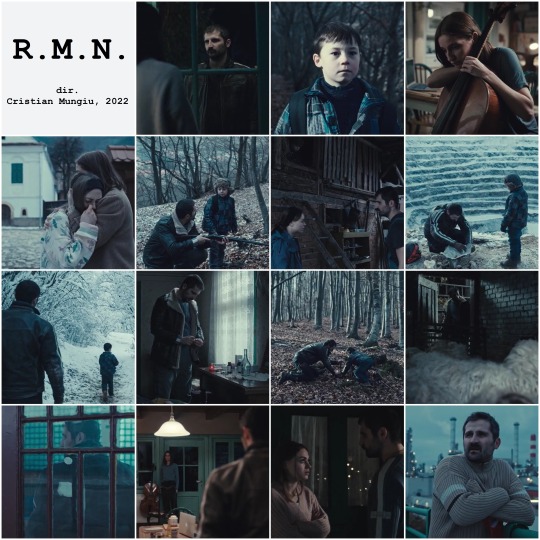
R.M.N.
directed by Cristian Mungiu, 2022
1 note
·
View note
Photo





The Menu
Mark Mylod. 2022
Beach
Driftwood Beach, Jekyll Island, Georgia 31527, USA
See in map
See in imdb
#mark mylod#the menu#anya taylor joy#nicholas hoult#driftwood beach#georgia#united states#jekyll island#driftwood#branches#john leguizamo#hong chau#janet mcteer#paul adelstein#aimee carrero#reed birney#judith light#rebecca koon#rob yang#arturo castro#mark st. cyr#movie#cinema#film#location#google maps#street view#2022
120 notes
·
View notes
Text
since Countess Rosalia is only her last name, i sorta wonder what people think Penelope’s older sister’s name would’ve been had she’d been given a bigger role in the story.
personally after finding out abt this from lithi, i’ve mainly headcanoned her name as Andromeda Rosalia/Judith due to the name meaning “leader of humankind”, and it is also the name of a character in greek myths just like Penelope. though, i don’t feel set on the name since i don’t think it entirely suits her, plus i’m not very familiar her namesake other than her parents trying to sacrifice her to appease Poseidon. i do like the idea of naming her after a character from greek mythology since it’s a nice connection to Penelope lol. what do you guys hc her name to be?
#rosie's txt#kinda bummed her name isn’t rosalia tho it sounds lovely#also hc that since penny is their father’s favorite meddy (her nickname) is their mother’s favorite#unless if it was stated that she too favored penelope which damn#also jumping onto the ‘countess rosalia killed her husband’ bandwagon#bc that seems like something she would do#who made me a princess#wmmap#wmmap countess rosalia#wmmap rosalia#wmmap penelope#countess rosalia#penelope judith
10 notes
·
View notes
Text

judith said silas you are taking advantage of the situation for your own gain except that when i do it its totally justified. captain judith “state as the monopoly on the legitimate use of violence” deuteros you entrance me <3
#judith you are suuuuuuuch a great beacon of state violence#winning the imperialism game so well#judith deuteros#the locked tomb#gideon the ninth#so sorry to my followers im having a time today so much locked tomb posting muah kisses#eskildit posts tlt
28 notes
·
View notes
Text
The #MeToo disclosure is so fraught for the listener, so “fatiguing,” precisely because it creates moral obligations for us. The words “this happened” and “he did this to me” must change our behavior and bring us into solidarity with the rape victim. That means offering a lasting and concrete opposition to rape and to the impunity of those who commit it, rather than relying on pacifying clichés like, “I’m sorry that happened to you” or “That must be so hard.” The rapist must change in our esteem; his reputation and status must be lessened to reflect what he did. The rape victim must be acknowledged and restored to the full membership in the community that the rape denied her. We can no longer act as we once did; we can no longer behave as if we do not know something that we do. Not if we are to live honorably, or by our own principles.
But so many of us do not live honorably, and do not follow our own principles. To our shame, we find it too painful, or too difficult, to oppose rape; too costly to approach its victims with respect. And it is costly. The anger provoked by #MeToo, the exhaustion and annoyance felt at its parade of female suffering, might be best understood as a response to this shame. The rape victims, in their terrifying numbers and evident righteousness, were creating in us, their listeners, an obligation to transform our world. It was a task that most of us did not feel up to, and ultimately, it was one that we rejected.
What rape victims want is to not be betrayed this way, to live in a community that shares their values and sees the horror and the wrongness of sexual abuse. They want their friends and family and lovers to seek to eliminate such violence without having to be told to...They want a world where they do not need to be asked ["what do rape victims want?"]. This is the world we have not been strong enough to make for them.
-Moira Donegan (source)
#this whole review... moira i bow to you once again#feminism#cw rape#moira donegan#thinking about a rapist i went to hs with who raped a friend of mine. and who continues to enjoy the company of many/most of his hs friends#while meanwhile she barely is in touch with anyone from hs anymore.#thinking about how the female friend of one of the men who assaulted me wrote me off as crazy for stating the truth of what he did#mostly just hope she is ok and he didn't end up doing it to her too#anyway! everyone go read moira donegan and also judith herman
19 notes
·
View notes
Text
harrow is one of the main characters of tlt and she's so far behind on the lore. she still doesn't know gideon is jesus. like hello
#literally everyone else does at this point#fucking judith knows more about the current state of harrow's soulmate than hatrow herself#and i'm not certain judith and gideon have ever spoken a word to each other#ok no wait end of gtn when judith is in the chair bleeding out i think they did#but still#like i go crazy every time i remember this#text#mine#nona the ninth spoilers#nona spoilers#ntn spoilers#the locked tomb#tlt#the locked tomb spoilers#tlt spoilers#nona the ninth#ntn#htn spoilers#harrow the ninth spoilers
70 notes
·
View notes
Text
American hostages freed by Hamas

View On WordPress
#America#gaza#hamas#islam#israel#Jewish#judaism#Judith Raanan#meme#memes#middle east#muslim#Natalie Raanan#news#Palestine#religion#united states
7 notes
·
View notes
Text

Nikki Davis and Jordan Ploss in Wagarville, AL. State Hwy 43.
#Alabama#Wagarville#Hwy 43#AL State Hwy 43#My photography#My Photography#Photographers on Tumblr#black and white photography#Nikki Davis#Judith “Nikki” Davis#Jordan Ploss
2 notes
·
View notes
Text
youtube
Korn - Korn (October 11th, 1994)
Lineup:
Jonathan Davis - Vocals, Bagpipes
Brian Welch A.K.A. Head - Guitars, Backing Vocals
James Shaffer A.K.A. Munky - Guitars
Reginald Quincy A.K.A. Fieldy - Bass
David Silveria - Drums
Guest/Session:
Judith Kiener - Lullaby (Track 12)
#Korn#Nu Metal#Jonathan Davis#Brian Welch#Head#James Shaffer#Munky#Reginald Quincy#Fieldy#David Silveria#Judith Kiener#United States#USA#US#Youtube
6 notes
·
View notes
Text
2023 in Books, Part 2
(posting a day late, oops)
This was a pretty great literary year for me. Even the books at the end of this list I enjoyed reading. I left out an anthology I read for class (Peach Pit is ... interesting) and a book of poetry written by someone I know, just because I don't know anything about poetry and don't want my personal feelings about the poet (she's great) to muddle it even further. I also already posted a separate list ranking the six children's/YA books I read. That still leaves thirty-one books to rank, though.
As usual, this is based entirely on personal preference/enjoyment and not necessarily on quality of writing or story. I reserve the right to change my mind about this ranking as soon as I post it because I am fickle like that. (Although I don't think I'm going to change my mind about my number 1 choice.) Here ya go.
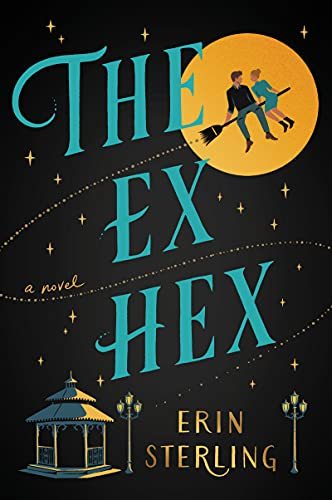
31. The Ex Hex by Erin Sterling
Dates Read: Dec. 12-13
GoodReads Rating: Three stars
Summary: A witch accidentally curses her ex-boyfriend, and by extension her small magical Georgia town. She and her ex have to lift the curse without falling in love (which of course they do anyway).
One-sentence review: (directly from my GR review) Cute and witchy, just the thing to get you through finals week.
30. Romantic Comedy by Curtis Sittenfeld
Dates Read: April 28-May 7
GoodReads Rating: Three stars
Summary: A musician and comedy writer seem to hit it off when the musician guest stars on the comedy writer’s late-night show, only for the writer to blow it by assuming the musician is a shallow womanizer. A few years later, they rekindle their connection during pandemic lockdowns.
One-sentence review: I liked the characters, but as usual Sittenfeld is more interested in commenting on whatever she saw on Twitter while she was writing this then she was on, like, writing a dramatic plot.
29. The Murder of Mr. Wickham by Claudia Gray
Dates Read: Aug. 19-27
GoodReads Rating: Three stars
Summary: All of Jane Austen’s beloved couples (except the Tilneys), plus the Darcys’ son and the Tilneys’ daughter, attend a house party at the Knightleys’ where Mr. Wickham turns up and is immediately murdered.
One-sentence review: This is what P.D. James’ Death Comes to Pemberley SHOULD have been.
28. Lessons in Chemistry by Bonnie Garmus
Dates Read: May 24-27
GoodReads Rating: Three stars
Summary: It’s the 1960s, and chemist Elizabeth Zott was kicked out of her Ph.D. program for reporting her supervisor for rape, and then loses her job after she becomes pregnant outside wedlock, and ends up starting her own STEM cooking show and some other stuff happens, look, I know you already read the reviews of this one.
One-sentence review: It was fine, I just thought it was overrated.
27. The Paris Deception by Bryn Turnbull
Dates Read: Aug. 23-Sept. 7
GoodReads Rating: Three stars
Summary: Two women immersed in the French art world in the 1930s and ‘40s defy their German occupiers by hiding, documenting, and sometimes copying “degenerate” art to keep it from the hands of high-ranking Nazi officials and sympathizers, or to keep it from being destroyed.
One-sentence review: The main characters were great and I really like the focus on protecting art and culture from extermination, but the constant time jumps drove me nuts.
26. Forever, Interrupted by Taylor Jenkins Reid
Dates Read: April 3-5
GoodReads Rating: Three stars
Summary: Less than two weeks into her marriage, a young woman is widowed and only meets her mother-in-law at the hospital. The two strangers find a way to navigate their grief together.
One-sentence review: While the grief could be gut-wrenching due to Reid’s fantastic writing, the characters were nothing spectacular.
25. Hell’s Half-Acre: The Untold Story of the Benders, America’s First Serial Killer Family by Susan Jonusas
Dates Read: Jan. 29-31
GoodReads Rating: Three stars
Summary: The Benders were a creepy family in late 19th Century Kansas who murdered people who stayed at their boarding house and then disappeared before they could be arrested.
One-sentence review: I’m not super into true crime—it has to be historical for me to even start it--but I did like the look at life in the Midwest.
24. Galatea by Madeline Miller
Dates Read: Jan. 6
GoodReads Rating: Three stars
Summary: Madeline Miller retells the Pygmalion myth in a way that doesn’t suck.
One-sentence review: Miller smartly skips the gender misery by making this a short story and then delivers an extremely satisfying ending.
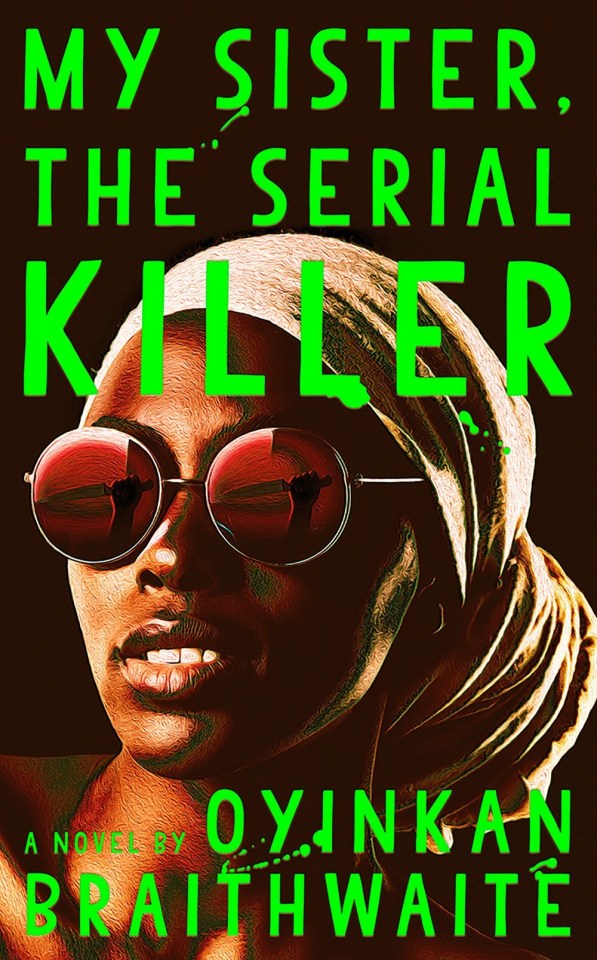
23. My Sister, the Serial Killer by Oyinkan Braithwaite
Dates Read: July 26
GoodReads Rating: Three stars
Summary: Korede and Ayoola are sisters who fall for the same man. Ayoola is hot and a serial killer, and Korede is getting pretty tired of covering for her.
One-sentence review: Despite (or perhaps because) all the characters are awful, this book STAYS with you, and I feel like it would be a blast to talk about in a drunken book club.
Note: I listened to the audiobook and want to give narrator Adepero Oduye a shout out.
22. The Weaver and the Witch Queen by Genevieve Gornichec
Dates Read: July 24-Aug. 17
GoodReads Rating: Three stars
Summary: Three friends in Medieval Scandinavia find themselves in the middle of a Game of Thrones-esque rivalry for the crown and a deadly battle between supernatural forces.
One-sentence review: Good story and I liked the characters, but it moved too slowly sometimes.
21. The Wedding Dress Sewing Circle by Jennifer Ryan
Dates Read: May 7-10
GoodReads Rating: Four stars (I was feeling more generous about Grace marrying Hugh than I am right now)
Summary: A sewing circle in a small English village in the 1940s decide to pool their talents and resources to help English brides wear the perfect white gown to their weddings, clothing rations be damned.
One-sentence review: Ryan excels at writing about women and civilians in wartime, and I would have ranked this so much higher if it hadn’t ended with the best character marrying the worst one.
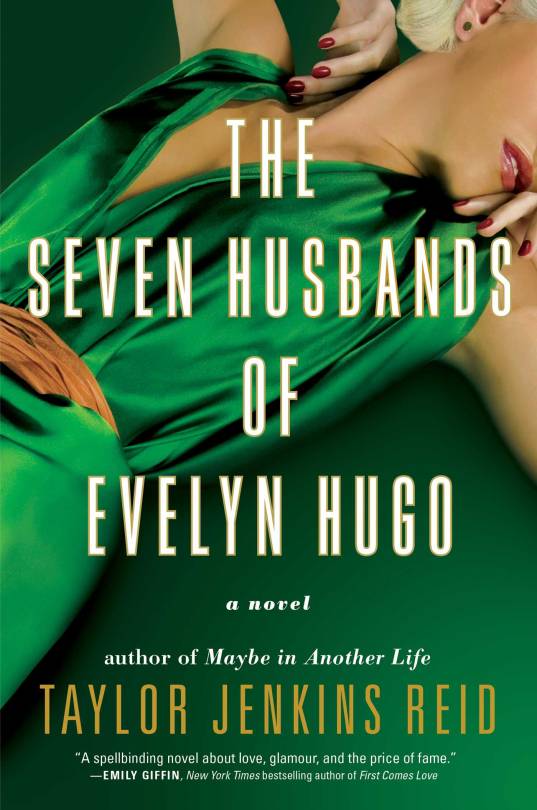
20. The Seven Husbands of Evelyn Hugo by Taylor Jenkins Reid
Dates Read: Jan. 31-Feb. 8
GoodReads Rating: Four stars
Summary: Aging actress Evelyn Hugo (who is not Elizabeth Taylor, by which I mean she absolutely is Elizabeth Taylor) invites a young journalist to write her life story.
One-sentence review: The plot was engaging and thought-provoking, but I never could decide how I felt about Evelyn.
19. A House with Good Bones by T. Kingfisher
Dates Read: Oct. 28-Nov. 1
GoodReads Rating: Three stars
Summary: An archaeologist visits her mother at the family home in North Carolina only to find that her grandmother’s ghost is haunting it. But how do you banish a ghost once you learn it’s keeping something far worse at bay?
One-sentence review: Of all the haunted house books I read this year, this one was the worst, and yet it was still great.
19. To Swoon and to Spar by Martha Waters (That’s right, I ranked a trashy Regency romance above both Romantic Comedy AND Lessons in Chemistry)
Dates Read: May 17-24
GoodReads Rating: Four stars (Objectively, this was too many, but I also don’t care.)
Summary: When Viscount Penvale’s uncle promises to sell him back the family estate for a steal if Penvale marries his uncle’s ward Jane, Penvale reluctantly agrees. He and Jane make an agreement to leave each other alone, but Penvale didn’t expect to fall in love with her. Nor did he expect his family house to be haunted.
One-sentence review: The Regency Vows series just keeps getting better, honestly.
17. A Walk in the Woods by Bill Bryson
Dates Read: Aug. 31-Oct. 13
GoodReads Rating: Four stars
Summary: Humor writer Bill Bryson and his on-again-off-again friend Katz decide to hike the Appalachian Trail, and Bryson tells you all about its history and natural resources along the way. There are moose, but no (confirmed) bears.
One-sentence review: This book got me really into nature and hiking again.
16. The Shining by Stephen King
Dates Read: Dec. 1-4
GoodReads Rating: Four stars
Summary: I know you know what this book’s about.
One-sentence review: Super tense, riveting look into the mind of a toxic, self-absorbed abuser who doesn’t need to be anywhere near blizzards, haunted houses, or children.
15. Carrie Soto Is Back by Taylor Jenkins Reid
Dates Read: July 12-23
GoodReads Rating: Five stars (Objectively, this book probably deserves that. Subjectively, I like Regency romances and journalists better than sports stars.)
Summary: A retired tennis star full of rage and ambition makes a comeback to keep a younger player from breaking her record.
One-sentence review: An absorbing, balanced take on the pressures women athletes face, plus a heart-warming father-daughter story, with some romance and female friendships to round it out.
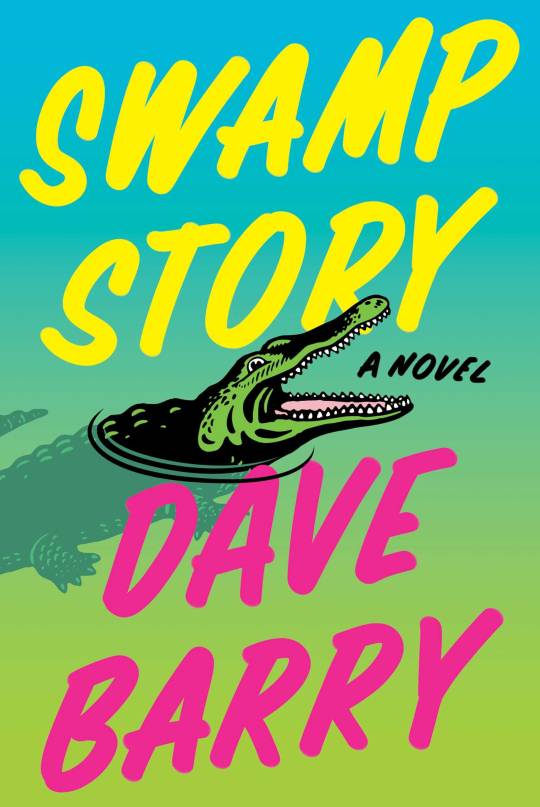
14. Swamp Story by Dave Barry
Dates Read: Dec. 30
GoodReads Rating: Four stars
Summary: There is actually too much going on to summarize this book, but suffice to say it involves a desperate single mom, her shirtless fame-hounding ex-boyfriend, a failed journalist with a drinking problem, and a lot of people in the Florida Everglades looking for a cryptid OR Confederate gold OR pythons.
One-sentence review: Dave Barry writes about Florida like it’s a drunk, eccentric relative who everyone hangs around at the family reunion even though he smells bad, because he has the best stories.
13. Vampires of El Norte by Isabel Cañas
Dates Read: Oct. 15-28
GoodReads Rating: Four stars
Summary: During the Mexican-American War, a Wuthering Heights-esque couple learn their homeland is being stalked by vampires.
One-sentence review: You root for the couple, you root for the Mexicans, you even root for the vampires once or twice, but you never root for the Texas Rangers.
Note: The couple is Wuthering Heights-esque in the sense that he is poor, she is rich, they were childhood sweethearts, and then they were separated—not in the toxic incest way.
12. A Lady for a Duke by Alexis Hall
Dates Read: July 12-23
GoodReads Rating: Four stars
Summary: A trans woman believed to be dead at the Battle of Waterloo reinvents herself and returns home to England, only to find that her best friend has been consumed by grief over her death. As she helps him heal—and he slowly falls for her—she battles with whether to tell him who she really is.
One-sentence review: I'm a sucker for love stories in which the couple are torn asunder, believe they will never see each other again, and then are reunited unexpectedly.
Note: This actually would have ranked a lot higher if all the main couple’s angst wasn’t basically resolved in the first half. The second half is fine but not as good.
11. The Lover by Silvia Moreno-Garcia
Dates Read: Dec. 26
GoodReads Rating: Four stars
Summary: A young woman must choose between two potential “lovers” who come from the woods in this dark fairy tale novella.
One-sentence review: Finally, a good werewolf book.
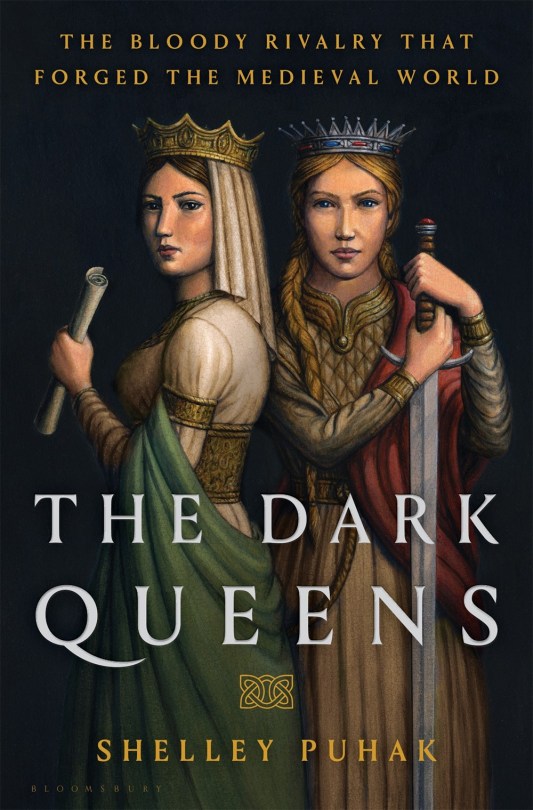
10. The Dark Queens: The Bloody Rivalry That Forged the Medieval World by Shelley Puhak
Dates Read: April 4-14
GoodReads Rating: Four stars
Summary: Puhak writes about the feud between rival Merovingian queens Fredegund and Brunhild in sixth century western Europe.
One-sentence review: It’s like Game of Thrones, but real, shorter, and with more women and less sexual assault.
9. Lafayette in the Somewhat United States by Sarah Vowell
Dates Read: Dec. 14-25
GoodReads Rating: Four stars
Summary: Vowell writes Lafayette’s biography, focusing on his and the larger French role in the American Revolution, all while musing on our country’s inability to agree on anything.
One-sentence review: Vowell’s irreverent essay style is just the tone needed to tackle the oft-romanticized American Revolution.
8. The Hacienda by Isabel Cañas
Dates Read: July 23-26
GoodReads Rating: Four stars
Summary: In the aftermath of the Mexican War for Independence, a young bride moves to her landed husband’s country estate, only to find that the house is super haunted and her new in-laws super racist.
One-sentence review: Your standard haunted house story, except the ghost is colonialism.
7. Under the Whispering Door by T.J. Klune
Dates Read: Oct. 29-31
GoodReads Rating: Five stars (was probably generous, but the ending had just made me cry, so)
Summary: When workaholic Wallace dies, his spirit is sent to a teashop for transition to the afterlife. But after a few weeks of hanging around teashop owner and “ferryman” Hugo, his reaper, and the ghosts of Hugo’s dog and grandfather, Wallace realizes he doesn’t want to leave what he’s coming to think of as his family.
One-sentence review: A lovely mixture of funny and sad, this book is a nuanced look at death and found family.
6. Mexican Gothic by Silvia Moreno-Garcia
Dates Read: Nov. 1-6
GoodReads Rating: Four stars
Summary: A debutante from Mexico City visits her cousin’s haunted house in the countryside where she’s pulled into a mystery surrounding her cousin’s eugenics-obsessed in-laws.
One-sentence review: Noemi is a fantastic character, and the plot is engrossing, which is good because you will hate all the other characters.
5. Into Thin Air by Jon Krakauer
Dates Read: Aug. 9-29
GoodReads Rating: Four stars
Summary: In 1996, Outside magazine sent Jon Krakauer to cover the burgeoning commercialization of Mount Everest. When Krakauer climbed the mountain himself, he and his team got caught in a freak snowstorm that resulted in what was then the worst disaster in the history of the mountain.
One-sentence review: Apart from being a really tense and riveting account of a brutal natural disaster in an already brutal environment, Krakauer’s account of the 1996 storm on Everest raises questions about who should be on the world’s highest mountain and whether money and fame have blinded guides and climbers to the risks of tackling the summit.
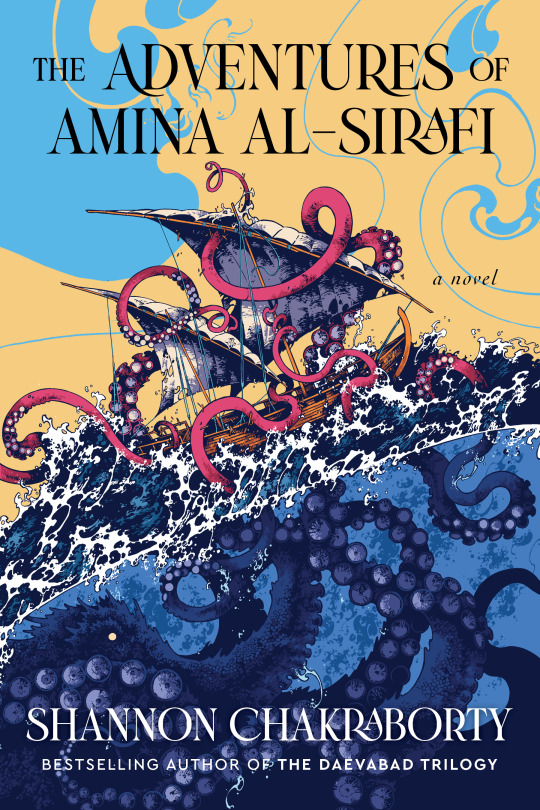
4. The Adventures of Amina al-Sirafi by Shannon Chakraborty
Dates Read: Nov. 20-30
GoodReads Rating: Four stars
Summary: Amina al-Sirafi, a retired smuggler and single mom on the Arabian peninsula, has to get her old band crew back together for the promise of more money than they’ve ever dreamed of when wealthy grandmother hires Amina to rescue her kidnapped granddaughter. But things go awry when the crew learns the girl is with an evil crusader with plans to unleash dark magic and monsters on the world. Inspired by the rich mythology, religions, and history of the Middle East, East Africa, and the Indian Ocean.
One-sentence review: I have not had so much fun reading a fantasy novel since I was a kid reading Harry Potter and I can’t wait for the sequel.
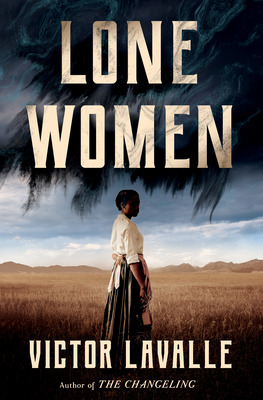
3. Lone Women by Victor LaValle
Dates Read: Oct. 5-12
GoodReads Rating: Four stars
Summary: In the early 1900s, a woman burns her parents’ mangled bodies in their California farmhouse and flees to Montana with a secret locked in a heavy trunk.
One-sentence review: Frankenstein meets Calamity Jane in this horror Western about race and female friendships.
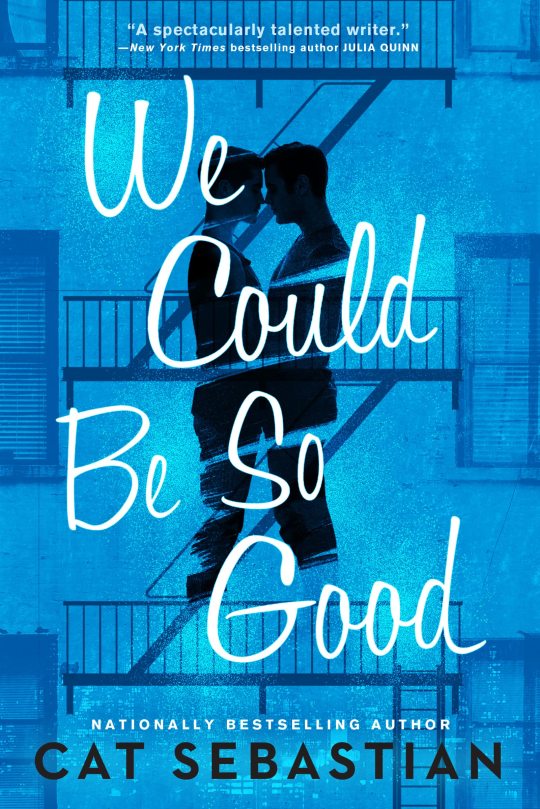
2. We Could Be So Good by Cat Sebastian
Dates Read: Oct. 28-Nov. 9
GoodReads Rating: Five stars
Summary: Two men reporting for a progressive newspaper in 1950s New York fall in love.
One-sentence review: I mean, it’s journalists in love in the 1950s, and one of them is investigating police corruption and the other covered a Civil Rights meeting in DC, so of course I loved this book.
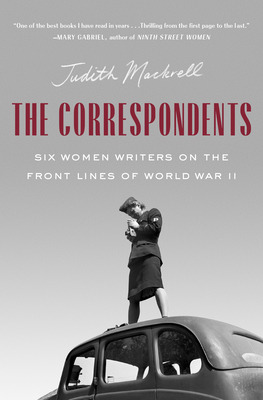
1. The Correspondents: Six Women Writers on the Front Lines of World War II by Judith Mackrell
Dates Read: Nov. 27-Dec. 26 (during finals and holidays with family—I don’t think I could have finished the book if it wasn’t so good)
GoodReads Rating: Five stars
Summary: Mackrell covers the WWII careers of six journalists—a correspondent in Berlin who ingratiated herself in the Nazi Party to tell America about Hitler’s plans for world domination; a photojournalist for Vogue who took pictures from the Blitz to Dachau; a young American whose coverage of both sides of the Spanish Civil War catapulted her to journalistic stardom; Martha Gellhorn whose fury at her husband (you’ve heard of him) compelled her to illegally stow away on board a hospital ship and cover the invasion of Normandy from Omaha Beach while helping wounded soldiers; a rogue freelancer who broke the story of the invasion of Poland and whose thrill-chasing career took her from there to Greece to North Africa and beyond; and Helen Kirkpatrick, who covered the liberation of Paris while Hemingway was getting plastered at the Ritz.
Review: There is too much to say about this book. Mackrell did an incredible job. These journalists’ triumphs and tragedies play out alongside the triumphs and tragedies of the world’s biggest conflict. Each woman had different motivations and goals, from thrill-seeking to career-making, from spite to idealism to simply a love of journalism and dogged search for the truth. While Sigrid Schultz’s Chicago editor applauded Hitler’s control of Germany, Sigrid warned his readers of Hitler’s ambition. When the world turned a blind eye to Hitler’s military build-up and annexation of half of Europe, Virginia Cowles and Helen Kirkpatrick wrote furiously against Chamberlain’s policy of appeasement. And while the rest of the world celebrated the end of the war in Europe, Lee Miller swept through Dachau taking pictures and refusing to ignore the human cost of fascism and war.
All of this was at great personal risk. The Nazis tapped Sigrid’s phone and searched her house until she was finally forced to flee to America in the early 1940s (where her editor promptly benched her for three and a half years). Virginia dodged bombs in Madrid, and Helen dodged bullets in Paris. And Lee Miller defiantly washed off the stink of Dachau in Hitler’s own bath, which was immortalized in a photo her equally defiant boyfriend took in the days after the Fuhrer’s death. Mackrell’s prose also gets into the nitty gritty of correspondent life, how the reporters all camped out in hotels and spent their days chasing stories and their nights drinking whiskey. She discusses the friendships and rivalries—Marth and Virginia became great friends in Spain and eventually wrote a play together satirizing the misogyny they faced during the war. And while the stars are the six I mentioned above, cameos include Mary Welch (Hemingway’s wife after Martha), Dorothy Thompson, Vogue editor Audrey Withers, and “Maggie the indestructible” who convinced an American commander to let her go on a bombing mission over North Africa, paving the way for other women correspondents on the front line after the US entered the war. Plus there are appearances from Picasso, both Randolph and Winston Churchill, Eleanor Roosevelt, Dwight Eisenhower, David Lloyd George, the Duke of Windsor after he abdicated, Hemingway of course, and half the Nazi high command. Mackrell uses the women’s own words to describe the bombing of Madrid, the mass evacuation from Paris, the refugee crises in Eastern Europe, and the Night of Long Knives in Germany. Every moment is riveting as Mackrell and the women she writes about pull you into Europe of the 1940s.
#iz blogs about books#long post#the correspondents#the correspondents was so good you guys#also in my top 10#we could be so good#lone women#the adventures of amina al-sirafi#into thin air#mexican gothic#under the whispering door#the hacienda#lafayette in the somewhat united states#the dark queens#authors are#judith mackrell#cat sebastian#victor lavalle#shannon chakraborty#jon krakauer#silvia moreno garcia#tj klune#isabel canas#sarah vowell#shelley puhak#i loved how many of those authors' names autofilled as i tried to tag this#there are 21 other books on this list so i'm not going to tag all of them#anyway#happy new year
6 notes
·
View notes
Text
Am I going to do a play by play of me watching Rest in Peace for the first time ever? Maybe, maybe not, but I will say I'm only 7 minutes in and already sobbing hysterically so things are going great
#the walking dead#i'm sorry but the parallels between rick + carl and daryl + judith are too much for me to handle#honestly he's the closest thing she's ever had to a father#cuz you know she doesn't remember rick all that well#and the majority of her life was spent without him and with daryl#the fact that in her delirious state of blood loss after being shot she looked up at him and asked “daddy?” i lost my mind#twd spoilers#probably should have tagged that first lol oops
3 notes
·
View notes
Photo
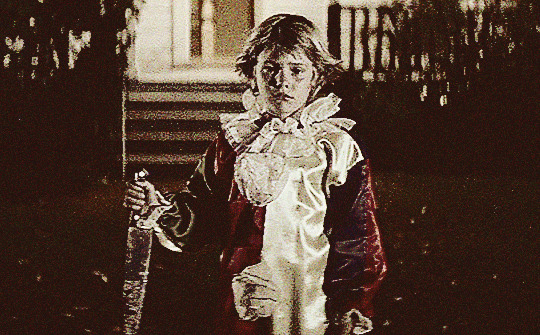

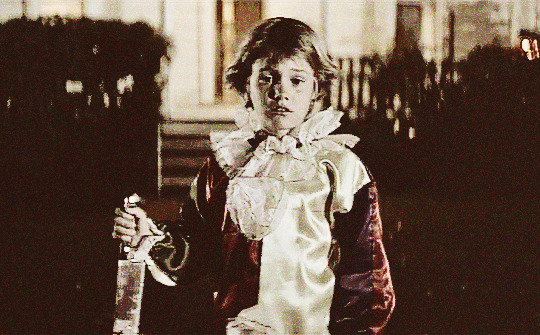
𝙷𝙰𝙻𝙻𝙾𝚆𝙴𝙴𝙽 𝙽𝙸𝙶𝙷𝚃 : ¹͟⁹͟⁶͟³͟
... ... THE BIRTH OF 𝐓𝐇𝐄 𝐁𝐎𝐎𝐆𝐄𝐘 𝐌𝐀𝐍.
do not reblog.
#mine.#blood /#: 1963 . halloween.#hello.... baby peepaw...#u can see that at first he's very much confused and agitated with his mask being ripped off. she doesn't understand what happened!#she doesn't realize what she's done. but then it sinks in. he just killed judith. he's no longer in a state of void.#his mask is important. it is the divide between him being evil and being just a boy / man.#michael is just a boy. michael with his mask on is an entity of evil. it's the curse...#in the third photo we see her just standing there in a trance like state.. the realization has shocked her to her core#its why she just stands there completely still. michael did not kill judith. the void did. the curse.#even with the mask on we can see that michael is unsure of what he's doing when he's killing judith#he continuously looks to his knife as if it's not him / his hand that's hurting judith while he stabs her.#michael loved judith she was his older sister. murdering her however was what truly sparked the myers curse and there is not a reason other#than the call of the void that made her kill judith.
12 notes
·
View notes
Text
So, I finished Lenin's "State and Revolution" and
It was surprisingly light reading - clear language, easy to understand and not tiring to read. He apologizes for the first few chapters being stuffy, because he uses a lot of Marx and Engels quotes, don't believe him - they're not.
He literally ends the book with a classical AO3 writer "sorry, guys, I didn't have time to write literally anything but the title for the next chapter, and I'm afraid I'd be too busy to work on it for a while, we're kind of doing a revolution".
Will this make me actually finally write that Imperium Revolution fic this October? Maybe. We know too little about the Imperium economical state to apply class theory to it, so...
Anyway, loved it, currently starting "Gender Trouble" by Judith Butler and I'm already struggling to get through the intro so it's probably going to be a long ride.
2 notes
·
View notes
Text

The Sargent House Museum, home of Judith Sargent Murray and John Murray, at 49 Middle Street in Gloucester, Massachusetts, United States
0 notes
Text
Thoughts on Judith Jarvis Thompson's A Defense of Abortion.
For those unfamiliar, A Defense of Abortion is an extremely powerful and quite entertaining defense of the morality of abortion by Judith Jarvis Thompson. I’ll link a PDF at the bottom of this blog READ IT.
In A Defense of Abortion, Thompson argues that, even if one concedes that fetuses are people, abortion is still morally justified in most cases. To support this argument, she uses a rather ingenious hypothetical. I could summarize it, but honestly, I think you deserve the full experience.
“Let me ask you to imagine this. You wake up in the morning and find yourself back to back in bed with an unconscious violinist. A famous unconscious violinist. He has been found to have a fatal kidney ailment, and the Society of Music Lovers has canvassed all the available medical records and found that you alone have the right blood type to help. They have therefore kidnapped you, and last night the violinist's circulatory system was plugged into yours, so that your kidneys can be used to extract poisons from his blood as well as your own. The director of the hospital now tells you, "Look, we're sorry the Society of Music Lovers did this to you-we would never have permitted it if we had known. But still, they did it, and the violinist now is plugged into you. To unplug you would be to kill him. But never mind, it's only for nine months. By then he will have recovered from his ailment, and can safely be unplugged from you.” (Thompson, 48-49).”
In this case, it is absurd to claim that it would be immoral to unplug yourself from the Violinist, even though doing so would kill him. Thompson uses this analogy to show that adult humans do not have an unqualified right to not be killed, rather, we have a right not to be killed unjustly (Thompson, 57). Thus, a killing is morally justifiable if and only if the killer did not violate the rights of the killee. Because the Violinist has no right to use your body against your will, you are justified in killing him by unplugging yourself.
The Violinist argument is, however only perfectly applicable in the case of pregnancy caused by rape. In cases where a woman voluntarily engages in sexual intercourse, it seems at least plausible that she has given the resultant fetus a right to use her body, as she is partially responsible for its situation. Thompson concedes that there are some cases in which this may be true (Thompson, 59) but believes that such cases will be limited. To demonstrate this she uses the following 2 hypotheticals.
“If the room is stuffy, and I therefore open a window to air it, and a burglar climbs in, it would be absurd to say,"Ah, now he can stay, she's given him a right to the use of her house-for she is partially responsible for his presence there, having voluntarily done what enabled him to get in, in full knowledge that there are such things as burglars, and that burglars. It would be still more absurd to say this if I had had bars installed outside my windows, precisely to prevent burglars from getting in, and a burglar got in only because of a defect in the bars. It remains equally absurd if we imagine it is not a burglar who climbs in, but an innocent person who blunders or falls in.” (Thompson, 58)
And
“Suppose it were like this: people-seeds drift about in the air like pollen, and if you open your windows, one may drift in and take root in your carpets or upholstery. You don't want children, so you fix up your windows with fine mesh screens, the very best you can buy. As can happen, however, and on very, very rare occasions does happen, one of the screens is defective; and a seed drifts in and takes root. Does the person-plant who now develops have a right to the use of your house? Surely not-despite the fact that you voluntarily opened your windows, you knowingly kept carpets and upholstered furniture, and you knew that screens were sometimes defective.” (Thompson, 59)
Thompson uses these hypotheticals to demonstrate that one may justifiably abort accidental pregnancies. However, her logic here is somewhat more shaky. To see why, let us consider her first hypothetical.
Imagine that you take your houseboat into a remote corner of the Pacific Ocean for a year of peaceful meditation. You’ve been planning this trip for years. You’ve purchased, good food, fresh water, and every currently published Brandon Sanderson book. You can’t wait! About three months into your journey, the boat is rocked by a terrible storm. When the winds finally die down and the sky clears, you find an unconscious woman has been blown onto your boat. Can you ethically dump her overboard?
You most definitely did not give her permission to come aboard, nor are you in any way responsible for her position. What is more, if you let her stay, you’ll have to spend the next nine months feeding and housing her, and you’ll lose your opportunity to meditate. Even more concerning, for all you know, she could be a deranged serial killer who will murder you at the first opportunity.
On the other hand, it seems immoral to dump her overboard even though not doing so would be expensive, inconvenient, and potentially dangerous. This is because we have an intuitive duty to aid innocent strangers who, through no malicious action on anyone's part, have ended up at our mercy, especially when the result of our refusal to aid them is their inevitable death. I believe that Thompson does not sufficiently grapple with this intuitive duty in her hypotheticals. In the first one, an innocent person who stumbled into your house could presumably survive stumbling back out of it and, therefore, is not in the same position as a fetus. In the second one, the subject of the hypothetical is a de-anthropomorphised plant person, as opposed to an adult human.
For these reasons, I do not believe that Thompson has supported the argument that accidental pregnancies may be permissible aborted, even conceding that a fetus has the same moral status as an adult human.
And don’t get all Peter Singer on me about the logical consequences of a duty to aid. If I addressed all the potential problems with my argument, this would be 20 pages, and I would have spent far to long on it.
Judith Jarvis Thompson, A Defense of Abortion:
https://philpapers.org/go.pl?id=THOADO-2&proxyId=none&u=http%3A%2F%2Fwww.jstor.org%2Fstable%2Fpdfplus%2F2265091.pdf
#philosophy#ethics#abortion#unedited#no this isn't me stating my personal opinion on the morality of abortion put your flaming pitchfork away#Where did you get a flaming pitchfork anyway?#Judith Jarvis Thompson#I could have spent the last two hours playing stellaris#I guess this was more productive
0 notes